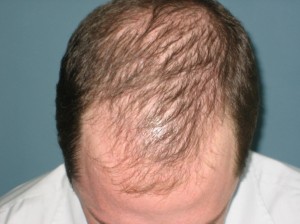Better treatment for Baldness approved by FDA
 Millions of men suffer from thinning hair, and some spend a fortune on hair loss treatments, such as Rogaine, Propecia and other products. With so many balding scalps, profit-based pharmaceutical companies are constantly doing research on new drugs aimed at regrowing hair. Recent breakthroughs have pointed toward a future cure; however, according to some, a male pattern baldness solution already exists and is readily available to patients who ask for it.
Millions of men suffer from thinning hair, and some spend a fortune on hair loss treatments, such as Rogaine, Propecia and other products. With so many balding scalps, profit-based pharmaceutical companies are constantly doing research on new drugs aimed at regrowing hair. Recent breakthroughs have pointed toward a future cure; however, according to some, a male pattern baldness solution already exists and is readily available to patients who ask for it.
A Cure for Male Pattern Baldness?
According to a handful of doctors, the FDA has already approved a new drug that treats hair loss better than Rogaine and Propecia; however, it’s not advertised for this purpose.
Manufactured by Allergan, Bimatoprost was initially made to treat glaucoma. As a side-effect, the drug actually thickened eyelashes, and the pharmaceutical company responded by marketing it for that purpose under the name Latisse.
From the beginning, doctors wondered if Latisse might have the same success on scalp hair as it did on facial hair. According to Dr. Alan Bauman, a board-certified hair restoration physician in Florida, it does.
How does it work?
Latisse apparently works similarly to Rogaine by thickening existing hair to promote better coverage. It doesn’t actually regrow hair, and it hasn’t been approved by the FDA as a treatment for hair loss. However, there’s no law forbidding doctors to prescribe the medication to balding patients, and says he’s prescribed Latisse to several balding men who’ve experienced positive results.
Currently, the FDA is conducting alopecia trials to see just how effective Latisse is as a male pattern baldness solution; however, it may take a long time before the drug is effectively marketed for that reason. In the meantime, interested patients can talk to their doctors to see if they are willing to prescribe Latisse for the purpose of slowing or preventing male pattern baldness.
Top Ten Myths about Male Pattern Balding and Hair Loss
 For those in the field of the hair loss sciences, we are constantly confronted by bizarre beliefs and persistent myths on the cause and nature of hair loss and male pattern baldness, that have no basis in truth.
For those in the field of the hair loss sciences, we are constantly confronted by bizarre beliefs and persistent myths on the cause and nature of hair loss and male pattern baldness, that have no basis in truth.
From notions that male pattern baldness loss is passed on from the mother’s side of the family, to beliefs that frequent ejaculation will make you go bald, or that cutting your hair short will strengthen your hair, there are many myths that have a special place in the hearts and minds of many in our society, but are simply untrue.
So in the interests of spreading some truth on the genesis of hair loss, we attempt to debunk the top 10 myths about hair-loss and balding.

1. Some hairstyles themselves do not cause hair loss: False
Surprisingly, there are certain hairstyles which can in fact cause hair loss, and permanent hair loss at that.
Some extreme hairstyles that place constant pressure on the hair follicles can cause problems with hair loss in women (and men).
Hairstyles with cornrows and ponytails can put excessive pressure on your hair and cause a permanent hair loss condition known as traction alopecia.
2. Washing your hair every day makes it fall out: False
Washing your hair regularly won’t make it fall out; those hairs at the bottom of the shower are already released hair strands that your shampoo has simply removed. A dirty head of hair may make for better bed head hairstyles, but it’s certainly not extending the life span of your follicles nor preventing baldness.
3. Blow-drying makes your hair fall out: False
While it can damage, burn or dry your hair, blow-drying isn’t the root problem of hair loss. Hair that has been damaged by blow-drying may fall out, but unless you’re suffering from male pattern baldness, it will grow back almost immediately. The same applies to straightening your hair.
4. Cutting your hair short will make it grow back thicker: False
While frequent haircuts do not prevent male pattern baldness, hair does feel and look thicker after a haircut because your hair is naturally thicker at the base.
5. If your maternal grandfather is bald, you’ll go bald: False
The old myth that you inherit baldness from your mother’s side of the family is a total myth. The hair loss gene is hereditary but comes from either your maternal or paternal side. So you can stop blaming your mum and start putting some of the guilt for creating a bald son onto your dad.
6. Frequent ejaculation causes baldness: False
The old saying, ‘If you keep playing with that you’ll grow hair on your palms’ isn’t the only fable relating to sex and hair. No matter what old wives say, you can rest easy that there’s absolutely no truth in the rumour that frequent ejaculation can cause hair loss.
7. Wearing hats causes hair loss: False
Unless you’re wearing a swimming hat on a daily basis or a hat that’s tight enough to put excessive tension on your hair, wearing hats shouldn’t be pulling your hair out even if you’re wearing one 24 hours a day, seven days a week.
8. Losing 100 strands of hair a day is normal: False
Most of us have between 100,000 and 150,000 hair follicles in our scalp, 90% of which are, if you’re lucky, growing at any one time. The saying that we lose 100 of these hairs per day is a gross overestimate; it’s actually more like 20-50 a day. The upside is that those hairs you see in the bottom of the bath or shower every morning are totally normal.
9. Hair products cause hair loss: False
Despite what people may say, the amount of product you put on your hair doesn’t affect hair loss. Gel, wax, mousse, hairspray… you can plaster as much on as you like and be safe in the knowledge that it isn’t going to make your perfectly styled hair fall out.
10. Stress causes hair loss: True (but)
Stress can cause hair loss, but this hair loss is temporary. Stressful events such as illness and money worries can cause hair production to stop temporarily, but stress is not the cause of male pattern baldness.
If you suffer from male pattern baldness, this in itself can also cause stress, but removing the stress will unfortunately not stop the hair loss.